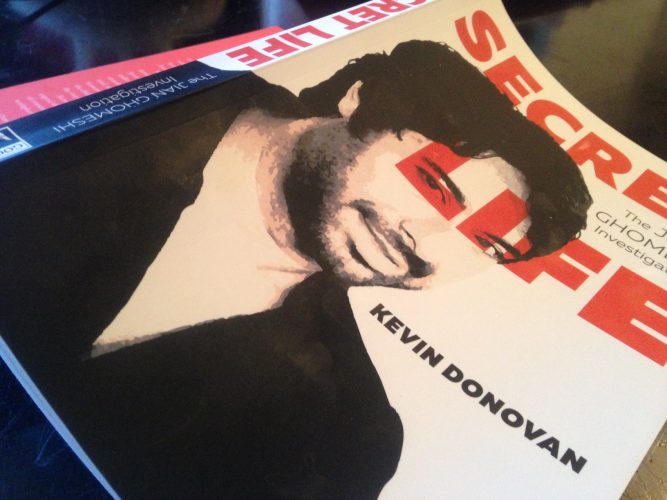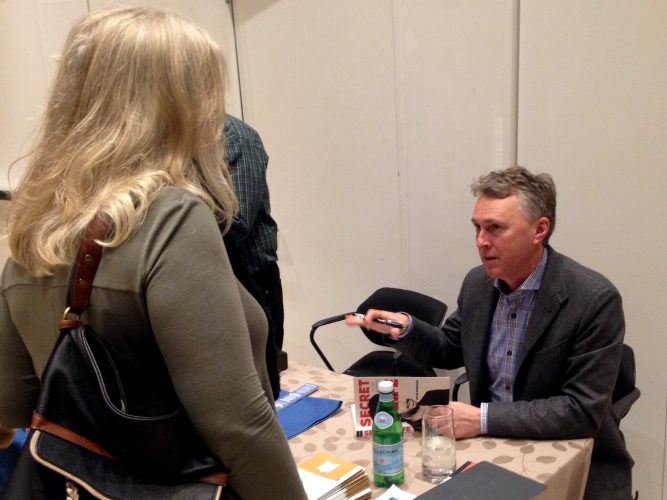Journalism
Kevin Donovan: ‘More important to be right than to be first’
Toronto Star reporter describes the Jian Ghomeshi investigation during his book tour

caption

caption
Cover of Donovan’s book, which delves into the investigation of Jian Ghomeshi.He had a wet, weak handshake.
“How is your book doing?” asked Jian Ghomeshi, sitting down.
It was early September 2014 and Kevin Donovan, investigative reporter for the Toronto Star, was in the midst of a full-scale investigation of Ghomeshi’s private life. He had been investigating the CBC’s radio host for months. Related stories
And now, by a stroke of luck, they had been seated beside each other at a private dinner at Toronto’s Four Seasons Hotel. Donovan knew he had been given an opportunity to confront Ghomeshi face to face.
“I think it is time for you to confront this and tell the truth,” Donovan recalled saying.
Reading from his book, Donovan recounted Ghomeshi’s answer: “There’s nothing to say. You have the truth.”
This scene, explained Donovan to a crowd at Halifax’s Central Library on Sunday, became the heart of his book Secret Life: The Jian Ghomeshi Investigation.
Despite this confrontation, dozens of interviews and hours of research, Donovan wouldn’t be ready to publish the allegations against Ghomeshi until October 2014.
‘Important to be right’
“To me, as an old fashioned journalist, I believe it’s more important to be right than to be first,” said Donovan during an interview before his talk, which was part of his book tour.
Donovan published his extensive findings only after Ghomeshi had been fired from the CBC in late October 2014 and had released his infamous Facebook post.
Jesse Brown, host of the popular podcast Canadaland, was a part of Donovan’s investigation. The two clashed over journalistic principles. Donovan said Brown felt it was important to publish immediately.
“The difference between Jesse and I is that he didn’t ask the tough questions of people,” Donovan said.
During his investigation, Donovan interviewed 17 women and two men. For him, accurate reporting is a moral responsibility.
He’s good at it too; Donovan has won three National Newspaper awards, two Michener awards and three Canadian Association of Journalists awards.
“Some of the women got upset with me because I was asking why did you go back, why did you send a video after you were allegedly choked,” he said.
It’s not that he didn’t believe the women.
“In my career, there have been people who have come forward with false allegations about others,” said Donovan. “We’ve looked into them and discovered that these allegations were incorrect. You don’t want to be wrong.”

caption
Kevin Donovan signing copies of his book at Sunday’s event.Advice to young journalists
Donovan says that young journalists need to be careful about making information public before it has been verified. It is one of the challenges posed by social media and society’s ability to spread news quickly.
“People pour information out into the Twitterverse. One of them happens to be the president of the United States who just says stuff without any proof,” Donovan said.
However, Donovan says he sees positive signs concerning the state of journalism. Subscriptions to publications like the New York Times have increased dramatically since the election. Good, responsible journalism still has its place.
“So long as we keep publishing good stories and getting them right, I think we’re going to be OK,” said Donovan.
Social media as a tool
Donovan acknowledges that social media has revolutionized the world of journalism. In the wake of the Ghomeshi story, social media served as a positive platform for conversation.
“I didn’t realize it was going to be that big so quickly, quite frankly,” said Donovan. “I was shocked by the cult of personality. What I’ve learned is that if you write and investigate about somebody that everyone already knows, there is a waiting audience.”
Less than four days after the story broke, that audience helped start a national conversation about sexual violence. The #beenrapedneverreported campaign offered an outlet for people to share their stories of abuse.
The fight against sexual violence has continued since the Ghomeshi trial through organizations like When You’re Ready, which is a platform for survivors.
http://t.co/fnWrJTMO9h gives a voice to survivors of #rape and sexual violence… You’re not alone. #Beenrapedneverreported
— WhenYou’reReady.org (@WYRProject) January 14, 2015
“I think that’s the really positive part of social media,” said Donovan. “It really allows people to tell their story and to reach out to people; it lets them know that they’re not alone.”
But as an old journalist, he says, there’s still room for improvement.
“I’m still struggling to figure out how to use it,” he said.

